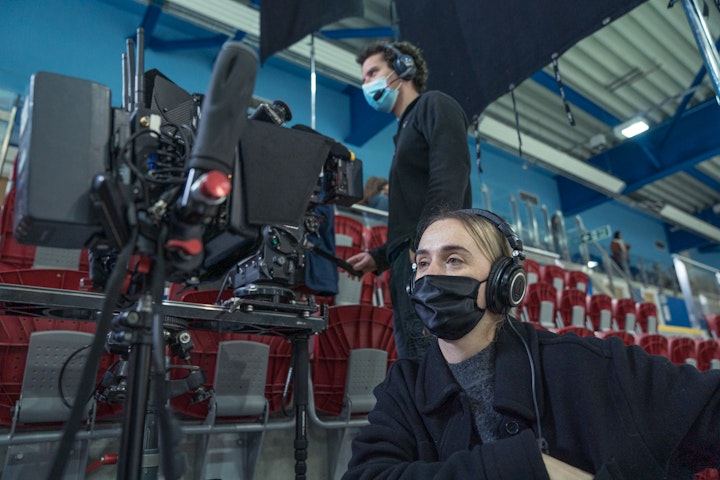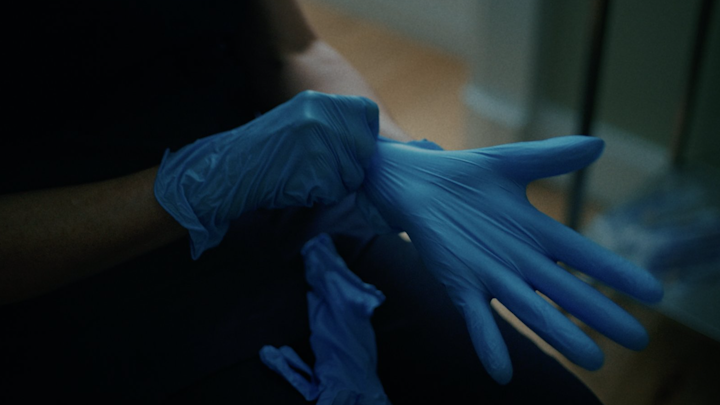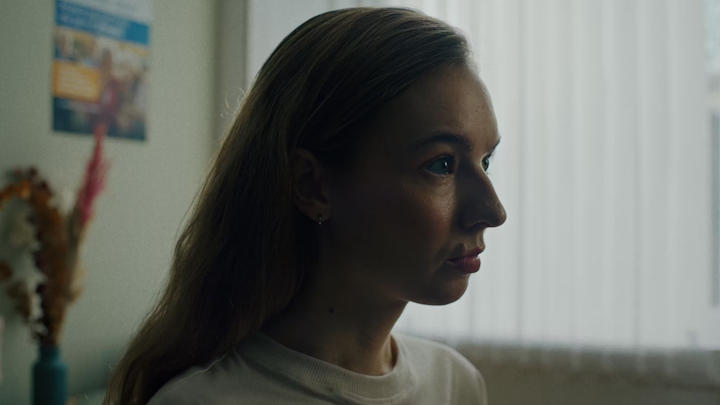Q&A FOR INTERNATIONAL WOMEN’S DAY WITH RUTH PAXTON
Q: Thank you so much for joining MTP today for this interview! I guess I'll get straight into the questions and my first one is where it all began. When did you decide that you wanted to be a filmmaker?
A: That's a question I’ve been asked quite a lot and I still haven't found a definitive response. I recognise now, looking back, that I was always interested in storytelling. I used to think I wanted to be an artist when I was really wee and would say that I wanted to be Vincent Van Gogh! But I came from quite an artistic household. I was always making stuff and my brother and I got access to cameras and made a lot of films on VHS. We also watched loads of movies. It was a big part of our socialising, celebrating and relaxing in our family. But I certainly knew in my late teens that I wanted to be a filmmaker for sure. I started to understand more about the mechanisms behind the movies and I often cite Tim Burton's work as a pinnacle moment for me, because I realised what a director's voice was. I understood that Burton had a very specific vision and I felt his presence in the films of Beetlejuice and Edward Scissorhands.
Q: How do you think your background in art has influenced your filmmaking and visual style?
A: When I came out of art college, fairly unemployable, design was what I pursued as a way to try and move into the industry, but I realised really quickly that it wasn't for me. I think the art college background and my interest in the arts is useful in regards to loads of aspects of writing and directing and I guess it has shaped me into more of a visual director than a technical director. I'm not a technical director. I'm not somebody that understands lenses inside out or how best to use lighting or cameras. I know what I want and I work with an exceptional cinematographer but I suppose at times it's been an anxiety of mine that I'm not good enough in that respect. I learnt later on that there are many different kinds of directors and I'm perhaps the director that really likes to work with actors and who gets into the visual language and aesthetic of the work I make.
Q: You talked about Tim Burton. Are there any directors, painters or visual artists who you draw inspiration from and who have inspired you as a filmmaker?
A: Definitely. People at the very start of my career who were very influential were Darren Aronofsky, Jane Campion and Lars von Trier. I really love the work of Jacques Audiard, Scorsese, Jonathan Glazer, Yorgos Lanthimos and Denis Villeneuve. Their films are really meaningful to me and I often come to reference them either in terms of visuals or tone when I'm writing. But as much as I will make reference to other cinema, most of my visual materials tend to be paintings or photographic work. I have a huge bank of images that I've been saving forever and I have a lot of reference books and that, for me, is the easiest way to spark inspiration. I'm a huge fan of baroque art, so Caravaggio and Gentileschi - that's not a secret. Pre-Raphaelite painting too. But equally, contemporary painters who are really big for me are Ken Currie and Jenny Saville and conceptual artists whose work I'm really into are Matthew Barney and Anish Kapoor. Then, there are designers like McQueen whose work wedges its way into my process as well, so it's really quite broad. I'm also a keen reader about death awareness and the vanitas theme and how, as a Western culture, we're quite frightened of the concept of death, and that's something that permeates all of what I do and people get very tired of me talking about it!
Q: In terms of using images as a reference point, you once said that your epiphanies strike anywhere. It could be a gallery or a doctor's waiting room. Has a story ever come to you after looking at just one image?
A: Absolutely. That happened in the German Historical Museum in Berlin. I saw a painting (called ‘Mars and Venus or The Horrors of War’, 1609 – unknown artist) and that was the start of a whole process of a film that I went on to write. I often say to students that it's a good idea to have a visual reference for a project that's your touchstone, whether that's when you're at the writing stage or going in to pre-production. It's really helpful to have a single image that reminds you why you wanted to tell the story. It’s also good to be wide-eyed as a filmmaker and receptive. When something strikes you as remarkable, write it down. I remember once being in a café and I was sitting next to a couple who were clearly having an argument, but it was a very quiet, passive aggressive argument and I just could not take my eyes off them and their body language. It was fascinating. It was drama happening. I think that’s really the best thing you can do as a director and a writer too, just to learn people and keep your eyes open, and then when something speaks loudly to you to analyse why it does that. I think that was the learning that I took from my art school. To interrogate ideas and not go with the first option – to think about different ways you could say the same thing. That way of thinking has served me really well when it comes to the writing process.
Q: Is there any advice you wish you'd received when you were starting out that you would pass on to filmmakers who are at the start of their journey?
A: I don’t have a really great answer for that, but I think good advice would be to expect for it to take a while. It’s generally the case that filmmakers prove their ability in short form, with increasing budgets for projects before ascending the industry ladder towards writing/directing TV and features. In the UK we have a pretty specific ladder to climb, which generally involves maturation through government funded regional schemes. Filmmakers at the start of their careers tend to come up through these schemes, so it’s a good idea to be wise to them and familiarise yourself with the people that organise them, at least by name! I’d say get used to the application process and shaping your project for readers, regardless of whether you’re application is successful or not, you will be getting your name on certain radars. And then just keep plugging. Also, with personal development as a director or a writer, I think getting to know your taste and your own voice is really valuable. As a filmmaker you’re constantly asked to express your vision, to pitch your projects and communicate your ideas, and I think having a really strong understanding of why you like the things you do is important. What directors do you like, and what is it about them that you like? What inspires you and why does it inspire you? Look at your Netflix watch list and ascertain what it is you’re watching most of, ask - what is my field, what am I in to? I think that's valuable.
Q: Great advice, thank you! Looking at your work, you once said that you're interested in exploring the development of emotional health in your films. What draws you to that aspect of storytelling?
A: I believe we all have the capacity to learn to live better within ourselves, and improve our experience of life for the time we’re here. Not that it’s easily done. I think all films are about character’s emotional, or mental health, really. Obviously, there are films about characters that have clinically diagnosed illnesses and narratives about that aspect of their person and experience of the world. I've always been drawn to stories about people who are experiencing poor mental health - Campion's early film ‘An Angel at My Table’ made a lasting mark on me. But there’s also our general day-to-day psychology as humans. We all have minds and our mental health to consider, as we do our physical health. Cinema is, at its best, a psychological medium, so it just makes sense for films to explore the workings of our heads, what it means to be human and all the unknowable, intangible stuff. A lot of my work tends towards the darker side of what our minds can do to us because that's really the scariest, most compelling thing I can think of. I'm extreme in how I am, and how I write, so I think that's probably why I'm attracted to digging into that mire! And I guess, otherness. That's interesting to me.
Q: Would you say that the horror genre allows you to interrogate those issues?
A: Definitely, because horror is about the loss of control and that’s fundamentally why we fear madness. Also, horror is scariest when you don't know what the threat looks like, or where the monster’s hiding. Like at the start of a horror film, and something’s stalking the protagonist, or goading them, but we don’t know what it is yet; what the audience’s minds will do to fill in that gap will boast something far scarier than anything you could actually create. That’s why a lot of the time when the monster or threat presents itself, whether that's an actual shark or some kind of supernatural beastie, it's like, ‘Oh, okay…’ I do think we're generally very desensitised these days, so people who are making mainstream horror are seeking more ways to terrify us with CGI creatures. I'm trying to circle back to your original question, but I think people are just interested in people and as a human race, we're curious about our capabilities and how dark we can go. What are we capable of?
Q: Going back to the vanitas theme and the fear of death, do you think we have a curiosity with horror because we're trying to confront our own fear of death, while within the safety of our living rooms?
A: I think we’re all morbidly curious about our own mortality, to a degree, but I think horror challenges how we view and understand human capacity for violence. We enjoy identifying our boundaries and learning about that aspect of ourselves. We want to understand what sets some of us apart, why do some of us stab our partners to death? And how far removed are we, from crossing that line? It's the same reason why we all drink the serial killer stuff on Netflix. I’ve watched it all, even the rubbish ones, they're addictive! And you’re absolutely right: I do prefer to be provoked and disturbed in a safe, cosy way.
Q: With International Women’s Day approaching, I wanted to ask whether you think things are changing for the better for women in the industry?
A: I think so. I mean, I suppose I hope so. Some of the most exciting films that are coming out and that I'm excited to see are all by women, including ‘Saint Maud’ which I hadn't seen and watched the other week and absolutely loved. And Prano Bailey-Bond's ‘Censor’ which premiered at Sundance. I’m really excited to see that.
Q: Is there anything that could be done better?
A: I suppose when you go to the top end of things like the Oscars, maybe there's an argument for a female director category. Maybe that would allow more female directors to have their work respected and seen. But for me that’s problematic, it's uncomfortable. I won an award a few years ago for a film I made called ‘Pulse’ and it was the first year that London Short Film Festival - who I am indebted to as an organisation because they've show me such great support throughout my career - introduced a best woman director category. And I won that. And it was amazing. And I'm so grateful, so please don't get me wrong - but I remember feeling that I'd have loved if it was just best director. You know? I'd have really liked that. But it's a step in the right direction. I'm not giving my award back! I'm not saying it's a bad thing, but it just means we've got a ways to go yet. And I don't have the answer. I suppose I would quite like for my sex and how I identify to not be relevant at all, really?
Q: Absolutely. You wouldn't sit down and say, this is a horror film by a man.
A: No, and you do get tired of being referred to as a female filmmaker.
Q: Exactly, you're a filmmaker. Speaking of filmmaking! I’d love to talk about your first feature film ‘A Banquet’ that you made last year. What was your experience making that?
A: It was great and it was equally, totally exhausting, but so rewarding and one of the best things I've ever done. I think for me it was one of the first films I've made where I felt like I knew what I was doing as well. I didn't doubt myself all day, every day, you know? I thought ‘Oh, I think I might be all right at this’, so that was a nice thing! It was written by an amazing American screenwriter called Justin Bull, and it was brought to me by producer Leonora Darby and I fell in love with it. She described it to me over the phone and I read it that afternoon. One of the reasons I really took to it was because it examined a lot of themes that preoccupy my own work.
Q: Exciting! When can we watch it?
A: The film has just been delivered, and we were very fortunate to sell it last year at the American Film Market, to IFC, who are keen for it to have a physical premiere. I don't yet know where it will premiere, but hopefully soon and hopefully at an event that we can all go to. But it’s strange because nobody's really seen it... Obviously the production team have seen it and my Granny has seen it, but it's very much under lock and key, so I'm starting to get this anxiety about people actually watching it. We really flew under the radar when we made it because we filmed during the pandemic and so, apart from the crew that were involved in seeing it through from the development stage and beyond, it feels like it's been a little secret in some ways.
Q: It must feel like your baby. You’ve created it and it's so personal to you, to then share it with the world…
A: It definitely is, sharing your work is so exposing. And not just to a fresh audience, but to the creative people with whom you made it, you want each of them to feel proud. We all watch colossal Hollywood A-list movies that cost millions and jillions and take years to complete, and when the credits roll we’ll say – “yeah it was alright!” We're all critics because we all watch films. It's definitely an art form that everybody and their uncle have an opinion about. Hopefully people will like ours.
Q: I’m sure they will. I can’t wait! Right, I've got one more question. If you could invite five people to a dinner party post Covid, who would you invite?
A: Can they be dead or alive?
Q: Dead or alive. Anybody!
A: See, this is just opening a whole can of worms. If you don't pick your dead granny, then you know, who are you?!
Q: They're already invited!
A: Right… so for my ritzy champagne dinner party I would have to host my favourites of the Hollywood Golden Era, so, Tallulah Bankhead, Frances Farmer, Elizabeth Taylor, Ava Gardner and Marilyn Monroe.
Q: Please can I come too?
A: Absolutely, I’ll make you a martini!





